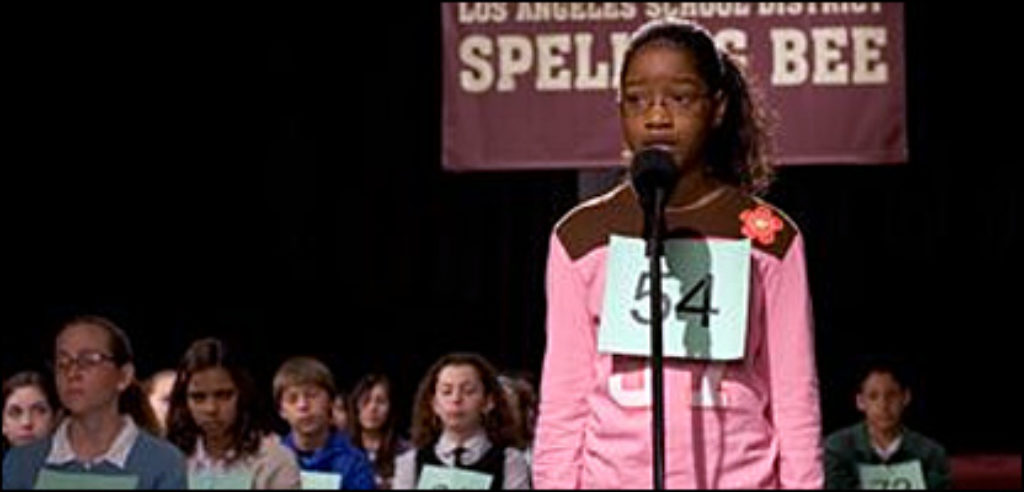
The Scripps Howard National Spelling Bee, broadcast annually on ESPN, grabbed greater public awareness a few years ago after the release of the fun, compelling documentary Spellbound. That film followed a handful of colorful middle-schoolers who qualified for the big spell-off in Washington, D.C. It revealed the high-pressure world of competitive spelling and offered healthy doses of genuine tension and humor.
Recognizing the dramatic potential of spelling as sport, Akeelah and the Bee writer and director Doug Atchison now tells the fictional story of a girl with natural spelling talent from a rough part of south L.A. Eleven-year-old Akeelah Anderson is forced to expose her hidden smarts when her principal pushes her to participate in the school spelling bee. At first fearful of being mocked as a “brainiac,” Akeelah warms to the idea of going to D.C. to compete on a national level. She also—eventually—agrees to be coached by the reclusive, strict, sometimes harsh Dr. Joshua Larabee.
The brilliant, sober teacher and the precocious girl begin to bond. But Akeelah’s widowed mother of four doesn’t like all the time her daughter is devoting to spelling. And she’s not happy about Akeelah taking the bus to the wealthy suburbs to practice with her new, brainy pals from the bees. To make it to D.C., then, Akeelah realizes she’s going to need to make some hard choices and find all the help she can get.
This moving little film is full of positive messages. Akeelah’s mom works hard to provide for her family, and Akeelah’s beloved older brother in the Air Force encourages her to do the best she can. Akeelah’s teen-mom sister and gang wannabe brother also help and encourage Akeelah. Even Akeelah’s late father continues to exert a positive influence on her with his love for words and solid, masculine example. The principal and teachers at Akeelah’s desperate school do a great job of recognizing Akeelah’s potential and pushing her to step out and try harder.
Dr. Larabee helps Akeelah recognize that she’s afraid of being too smart and wanting to do too well in life. His character also models great teaching techniques, directing Akeelah to a greater understanding of language to grow her spelling skills. In the process, the pair encourages each other to confront issues of grief and loss with which both struggle.
Akeelah is mostly welcomed by other kids from the wealthy suburbs, in spite of her lower income and unfamiliarity with the world of high-stakes spelling. One boy, especially, befriends and helps her to navigate her new surroundings. Another boy is cruel to Akeelah. But she soon realizes he is being mercilessly pressured by his unrelenting coach/dad, and she gains a real compassion for him that results in an act of great sacrifice.
Finally, the movie emphasizes that Akeelah’s success grows both out of her own hard work and the loving support of her community.
Dr. Larabee asks Akeelah to read a famous quote stating that our deepest fear is of our own greatness. It includes the line that we are “born to make manifest the glory of God that is within us.”
A boy with a crush on Akeelah kisses her unexpectedly (and chastely) on the cheek. Then he quickly says, “You’re not going to sue me for sexual harassment, are you?” Both laugh. She later returns his affectionate gesture.
A deceased character is said to have been killed in a random shooting. A couple of bullying girls at Akeelah’s school push her around and hit her.
The s-word is blurted out by a middle-schooler. There are also two or three uses each of “h—” and “a–.” A disliked boy is called a “turd juggler.”
Dr. Larabee is seen drinking alone in his office. Akeelah’s mom smokes.
While watching the spelling championship on TV, an older man from Akeelah’s neighborhood makes a disparaging comment about not liking another contestant who is Korean. When corrected that the boy is Chinese, he calls him “uppity.”
Atchison has crafted a moving, even inspirational winner of a film. It’s not that Akeelah and the Bee treads unique territory. The plot mostly follows the Rocky template, as our hero overcomes impossible odds for her shot at unlikely glory. In fact, things get downright corny at several key moments. But I didn’t care at all. The story had me, and it kept working right up to the end.
Credit Atchison for his lively writing and building into the tale a minor chord. We don’t just root for Akeelah because she’s the underdog, but because we resonate with the sadness in the lives of all the characters. Credit also the gravitas of heavyweights Laurence Fishburne and Angela Bassett in delivering graceful, sincere performances. And maybe credit most of all the amazing young Keke Palmer who makes Akeelah strong and sad and hopeful while remaining a believable tween.
It’s too bad the filmmakers felt the need to include a bit of foul language, because the film’s central messages are so utterly positive. Akeelah succeeds, in part, because she’s urged by loving adults to try, to believe that she’s capable of doing great things. And when she does try, her friends, family and neighbors rally to help her achieve her goals. That kind of compassionate discipline and communal support could help spell success for kids in every neighborhood, and it’s encouraging to see it in action in such a likable movie.
